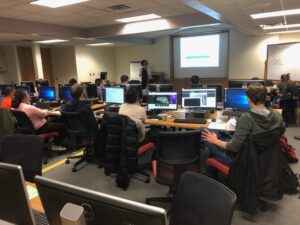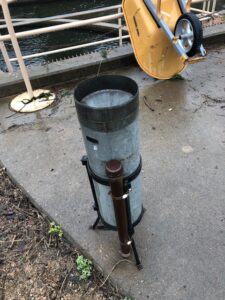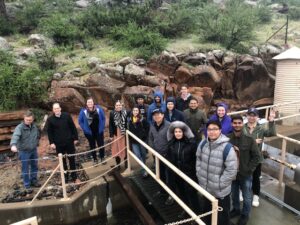HEPEX 2019 Year in Review
In the last HEPEX blog post of the year, we’re taking a look back at our highlights of 2019! This year, we published 25 blog posts, with contributions from HEPEX-ers across the globe.
But first of all, a quick reminder of important HEPEX events coming up soon:
- The abstract deadline for EGU 2019 (3-8 May, Vienna) is fast approaching – don’t forget to submit your abstract by 15th January! Click here for information on the Hydrological Forecasting sub-division over the past 10 years!
- In 2020, the Annual Meeting of the Asia Oceania Geosciences Society (AOGS) will be held in Hongcheon, South Korea from 28 June to 4 July, and will include a HEPEX session. Abstract deadline is 21st January – blog post with more information coming very soon!
- The 8th HEPEX international workshop on hydrological ensemble prediction will take place in Paris, France from 28-30 September! The workshop will be jointly organised with the Global Flood Partnership Annual Meeting. Save the date, and we’ll update the HEPEX website with more information soon!
Over the past year, HEPEX-ers have discussed their work at various conferences around the world, including at EGU in Vienna, AGU in San Francisco, the joint HSAF-HEPEX meeting at ECMWF in Reading just a few weeks ago, and at MODSIM in Canberra, Australia. We’re looking forward to hearing more about the research, discussions and future challenges from these two most recent meetings in blog posts coming soon! You can take a look at the presentations, posters, photos and watch recordings of talks from the HSAF-HEPEX meeting on “satellite inspired hydrology in an uncertain future” here. Co-chair Andy Wood organized and ran a new 3-day short-course on ‘The Science and Practice of Operational Ensemble Hydrological Prediction‘ in Boulder, with core contributions Marie-Amelie Boucher. Plus, we even had HEPEX co-chair Marie-Amelie Boucher and former co-chair Maria-Helena Ramos live-blogging from the IAHS meeting in Montréal, Canada in July. Click here to read about their experiences and what they loved and learnt from the meeting, including “Québécois” expressions!

Participants at the HSAF-HEPEX joint workshop at ECMWF in Reading, 25-28 November 2019. Photo: ECMWF
We’ve had a range of blog posts this year covering the scientific research of the HEPEX community and use of ensemble hydrological forecasts in operations:
- The importance of interdisciplinary research in improving forecasts of flooding from intense rainfall.
- An adventure game, developed by Louise Arnal & colleagues under the IMPREX project, allowing you to try your hand at protecting your city from floods.
- Improving hydro-met services in developing countries.
- The role of young professionals in the design and implementation of multi-hazard and impact-based early warning systems.
- A discussion of the “last mile” problem to take all our shiny new datasets and allow them to be used by decision-makers around the world for their specific questions, in one of our most popular blog posts of the year, “data drought and data flood”.
- And in just the past couple of weeks, we’ve had further discussions on improving the forecasting of two polar opposite events, flash floods and droughts.
We also published three fantastic new interviews with scientists in the field of hydrological forecasting this year – find out more about Maria-Helena Ramos’ scientific vision within and beyond hydrological forecasting, and the importance of the HEPEX community, how model uncertainty, diagnostics and information theory are interconnected in Earth sciences in this interview with Hoshin Gupta, and get to know our newest HEPEX co-chair, Marie-Amélie Boucher, in this interview where Marie-Amélie and Ilias discuss uncertainty quanitification, communication practicing and modern pedagogy of hydrological forecasts (a “Παν μέτρον άριστον” approach).
Speaking of interviews – this year, I decided to ask the HEPEX co-chairs what their HEPEX highlights of 2019 have been. This is what they said:
QJ Wang: One of the highlights for me in 2019 is the HEPEX session on hydrometeorological forecasting at MODSIM in December at Canberra (blog post coming soon!). It became clear that the level of interests and expertise in ensemble forecasting had had a quantum leap from a few years ago. Presentations covered improving forecasting methods, operational implementation and forecast applications.
Another highlight is the release of short-term continuous ensemble streamflow forecasts, recently started by the Australian Bureau of Meteorology. The service is based on SWIFT, a model developed by CSIRO in collaboration with the Bureau. It represents the work of many people and years. It was fantastic to see the milestone reached.
On reflection of work here at the University of Melbourne, a few highlights come to mind: the development of the Seasonally Coherent Calibration (SCC) model and its implementation Australia-wide; the beginning of a large ARC Linkage Project on water availability and demand forecasts and water management applications with seven research and industry partners; our research effort addressing the difficult problem of ensemble flood inundation forecasting through three PhD projects; and collaborations with NOAA CPC, NIWA, ECMWF and China.
Looking forward, I cannot wait to attend the HEPEX workshop in Paris. It will be a great opportunity to catch up with colleagues, learn about all the exciting work on ensemble hydrological forecasting, and plot pathways for moving forward.
Ilias Pechlivanidis: 2019 has been another year of achievements in relation to scientific and service evolution. I found it hard to select my favorites, but here are some of my highlights:
- C3S puts efforts on the Evaluation and Quality Control (EQC) function for the Climate Data Store (CDS). This is coordinated by BSC-CNS leading towards a homogenization of the provided EQC information across the various C3S datasets and all in one place with a unified language.
- EFAS and GloFAS Copernicus Emergency Management Services are continuously evolving their forecast products. The new release includes the sub-seasonal hydrological outlook based on the extended range forecast of ECMWF, which is issued twice weekly and extends to 46 days ahead. This upgrade is expected to be of high value in relation to the increase of flood preparedness.
- New role-play games aimed to train users’ ability to handle forecasting uncertainty. The Call4Water (from SMHI) and IMPREX (from University of Reading) games have been played with users from the research community, hydropower industry, water authorities, economists, policy-makers, and children at the European Research and Innovation days in Brussels.
- At COP25, HEPEX-ers shared experiences on hydro-climate services to guide decision-making under climate change (i.e. the hydropower sector), highlighting also the effort to bridge the knowledge gap through user engagement and service co-generation.
- This year different global climate models agreed on a high probability for a wetter and milder than normal winter for 2019-2020 in northern Europe. This clear prediction for the coming season is rare and it is generally interesting to wait and see if the predictions will be correct and how the energy market will be affected.
Fredrik Wetterhall: The highlight of this year in terms of HEPEX was the joint H SAF and HEPEX workshop on “Satellite inspired hydrology in an uncertain future”. The workshop concluded that a lot of ground has been covered since the last workshop 5 years ago, but more collaboration is still needed between the two communities. Look out for a HEPEX blog post coming soon with conclusions from the workshop, and in the meantime you have an article here from ECMWF.
The CEMS activities at ECMWF have been busy as usual. EFAS started 2019 with a new website, and both EFAS and GloFAS data became publicly available through the Climate Data Store (CDS). This enables researchers and the public easy access to the data. Several new developments happened, and I can mention the EFAS sub-seasonal forecast as a highlight.
2020 will be equally busy with major upgrades of both EFAS and GloFAS and more output being made available on CDS. I am also of course looking forward to the HEPEX workshop in Paris, hope to see you all there!
Marie-Amélie Boucher: Locally, my hydrological forecasting highlight for 2019 is related to the last spring freshet here in Quebec. As usual, we heard a lot about people wanting to reconstruct in the floodplain (and this is not even settled yet). However, for the first time I had the impression that this was not representative of the majority and that something was (albeit slowly) changing in the right direction. Never before had I heard so many citizens saying that they were finally considering moving away from the floodplain, and the government decided to cap flood compensation.
On a global scale, we heard a lot about applications of AI in hydrology this year. I’m curious to see if history (or research?) is only going to repeat itself, or if we are really going to see some cool innovations where AI is finally integrated harmoniously within the broader context of operational hydrological ensemble forecasting.
Andy Wood: I’m somewhat relieved to reach the end of an outrageously hectic year here at NCAR, with multiple ongoing projects with water agencies interested in ensemble hydrologic prediction. Amidst the nose-to-the-grindstone pace of it, the most enjoyable highlight has been, as always, the sometimes surprising way in which interactions with other HEPEX folk continue to happen around the world as the work to understand and develop ensemble prediction as ‘the standard’ continues, and increasingly succeeds. Meeting up with far-flung colleagues and co-chairs who put in the miles to engage in conversations about science (and life) provide some of the best moments of the year. As much as it is about the science, HEPEX is also about fun/friendly/energetic people involved!
Aside from that, I’m busy leading an effort to build a new ensemble-oriented configuration of the US National Water Model, and also excited about a new 3-day short course on ensemble streamflow forecasting that I organized last May, in Boulder, with sponsorship from CUAHSI. The participants were good-spirited guinea pigs for the first experimental course, but we had some outstanding contributions on topics including data assimilation, operational applications and value, pre-processing and post-processing, modeling and other topics from Marie Amelie Boucher and other colleagues (e,g, Martyn Clark, Tom Hamill, Michael Scheuerer and Joseph Bellier). Certain aspects can be improved and I hope we make this a regular offering — contributors welcome. Finally, and thankfully, our work is not done! 2020 will be another great year for HEPEX, and I look forward to celebrating it with as many as possible in Paris next summer.
What was your HEPEX highlight of 2019? Let us know in the comments!
We would like to invite you all to contribute to the HEPEX blog in 2020, if you would like to share your work / workshop / conference / field work / forecasting system / other brilliant idea with the HEPEX community! Find out more here.
- Short course on ensemble streamflow forecasting at NCAR in Boulder, Colorado
- Short course on ensemble streamflow forecasting at NCAR in Boulder, Colorado
- Short course on ensemble streamflow forecasting at NCAR in Boulder, Colorado



0 comments